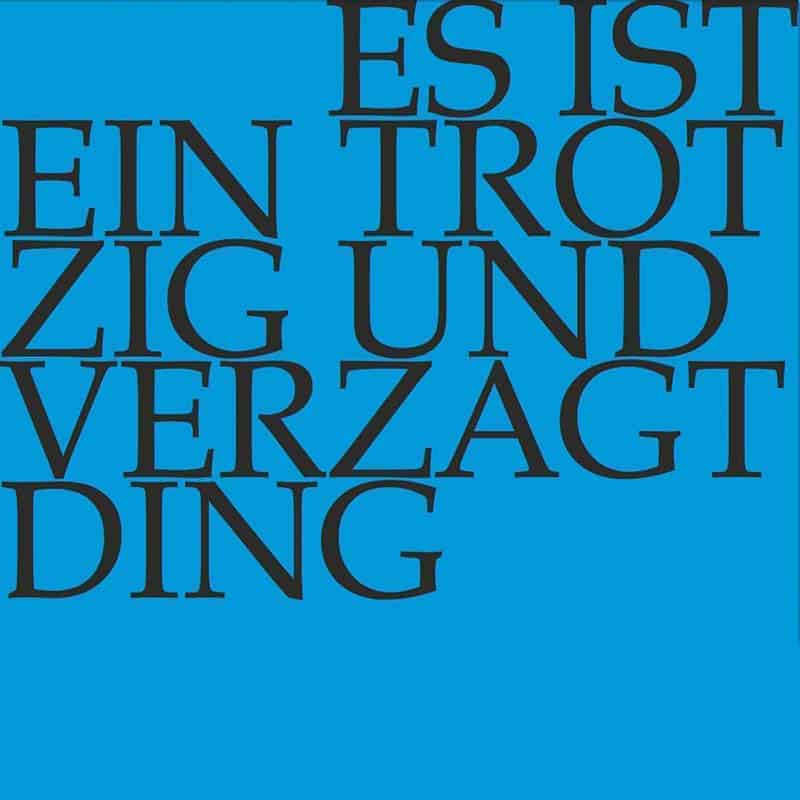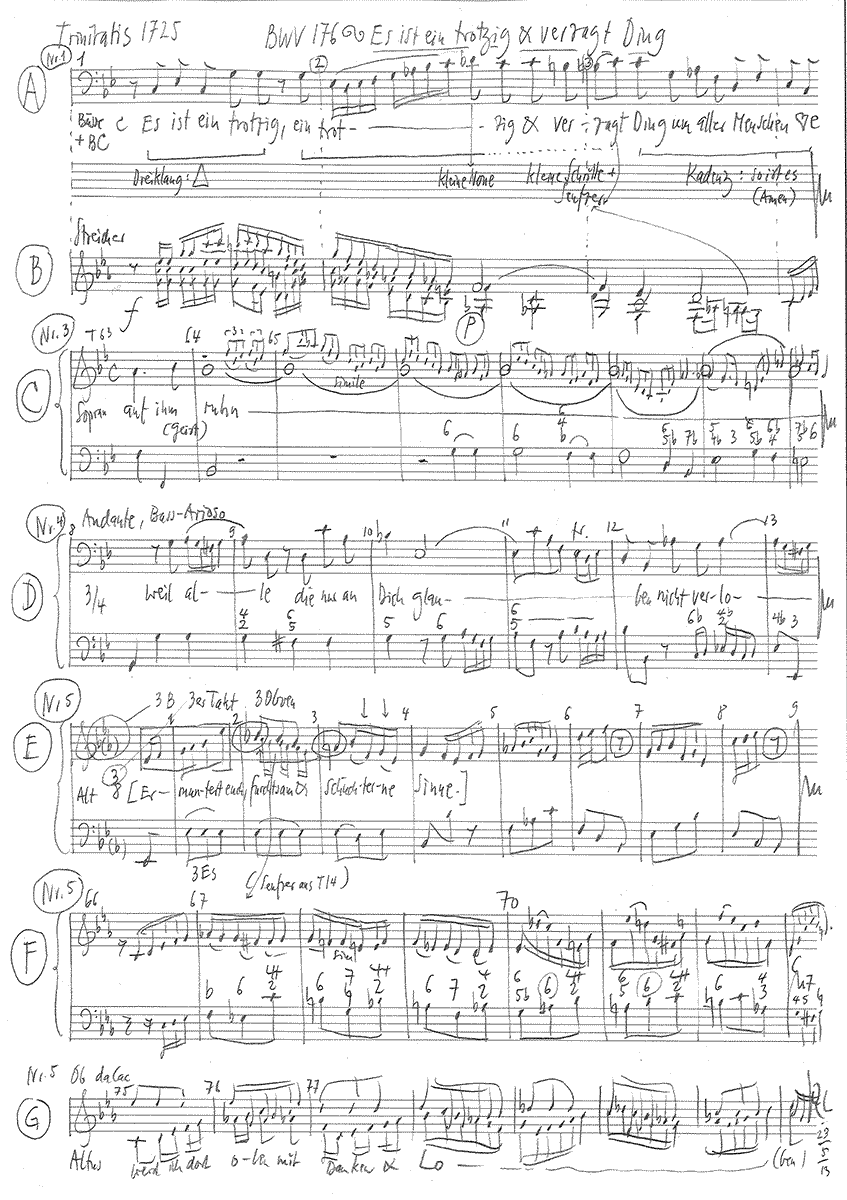Es ist ein trotzig und verzagt Ding
BWV 176 // For Trinity Sunday
(There is a daring and a shy thing) for soprano, alto and bass, vocal ensemble, oboe I+II, oboe da caccia, bassoon, strings and continuo

Would you like to enjoy our videos ad-free? Subscribe to YouTube Premium now...
Workshop
Reflective lecture
Choir
Soprano
Olivia Fündeling, Guro Hjemli, Susanne Seitter, Noëmi Sohn Nad, Noëmi Tran Rediger
Alto
Jan Börner, Katharina Jud, Francisca Näf, Alexandra Rawohl, Lea Scherer
Tenor
Marcel Fässler, Manuel Gerber, Raphael Höhn, Nicolas Savoy
Bass
Philippe Rayot, Oliver Rudin, Manuel Walser, William Wood
Orchestra
Conductor
Rudolf Lutz
Violin
Renate Steinmann, Monika Baer, Monika Altorfer, Sabine Hochstrasser, Martin Korrodi, Olivia Schenkel
Viola
Susanna Hefti, Martina Zimmermann
Violoncello
Martin Zeller, Hristo Kouzmanov
Violone
Iris Finkbeiner
Oboe
Dominik Melicharek, Thomas Meraner
Bassoon
Susann Landert
Lute
Hugh Sandilands
Organ
Nicola Cumer
Musical director & conductor
Rudolf Lutz
Workshop
Participants
Karl Graf, Rudolf Lutz
Reflective lecture
Speaker
Christina Aus Der Au
Recording & editing
Recording date
05/24/2013
Recording location
Teufen
Sound engineer
Stefan Ritzenthaler
Director
Meinrad Keel
Production manager
Johannes Widmer
Production
GALLUS MEDIA AG, Switzerland
Producer
J.S. Bach Foundation of St. Gallen, Switzerland
Librettist
Text No. 1
Jeremiah 17:9
Text No. 2–5
Christiane Mariana von Ziegler, 1728
Text No. 6
Paul Gerhardt, 1653
First performance
Trinity,
27 May 1725
In-depth analysis
In terms of its libretto, cantata BWV 176 initially seems an odd setting for Trinity Sunday. Yet the passages from the Gospel of John selected by librettist Christiane Mariane von Ziegler, Bach’s “poet of spring 1725”, indicate a considerable gap between the scene of Nicodemus’s secretive night visit to Jesus and the Saviour’s universal assurances, a disparity that echoes the strict division, typical for the Gospel of John, between followers of nascent Christianity and believers ascribing to the old Jewish faith. In this cantata, the contrast between the redeeming message of the Messiah and the fears of the Pharisee Nicodemus is, to an extent, removed from its biblical context and raised to a more general reflection on the human condition.
The gestural introductory chorus revels in the tension between “daring” uprising and “deceptive” retreat in a highly compact setting. In this choral fugue, strictly structured with successive entries from the lowest to highest voice, the woodwinds and continuo double the vocal parts, while the strings embellish the setting with a shimmering curtain of sound. The rigorously repeated dictum is characterised by constant motion, thus underscoring that the setting deals not only with an age-old story, but also the never-ending struggle in the human heart between spiritual strength and fearfulness – and thus ultimately between virtue and vice.
The ensuing alto recitative opens by explaining this troublesome “Verzagtheit” (deception) in context. Here, the fact that the noble Nicodemus only dares to visit Jesus at night is depicted as a departure from his Jewish faith – in contrast to Joshua from the Old Testament, who commanded the sun to keep shining to attain victory over the Amorites, Nicodemus longs for the cover of night. Here, it is interesting to note that it was none other than the librettist’s father, mayor Franz Conrad Romanus, who gave the citizens of Leipzig their first street lighting – 700 rapeseed oil lamps for Christmas in 1701 –and thus extended the day into the night, a fact that lends the lightdark metaphor of this cantata a charming biographical parallel.
The soprano aria “Dein sonst hell beliebter Schein” (Thy dear light, before so bright) comes across as a cheerful gavotte whose serpentine phrases presage the darkening words “Soll vor mich umnebelt sein” (must for me the clouds obscure). This line, addressed to the sun, captures the perspective of Nicodemus, whose admission of “Denn ich scheue mich bei Tage” (For by day I am too fearful) is marked by an odd gallantry that is perhaps suggestive of his high standing. In the middle section, by contrast, this timid follower is able to sing so convincingly of Jesus’ omnipotence and holy mission that the music, in a golden B major, is decidedly cheerful in character. The soloist is then notably silent in the da-capo, signifying that this development is irreversible – Nicodemus, at least in his heart, remains with Jesus.
In the next recitative, however, the figure who speaks might represent the fickle disciple: “So wundre dich, o Meister, nicht, warum ich dich bei Nacht ausfrage” (So marvel then, O Master, not, That I should thee at night be seeking!). And yet, the statement, sung in the sonorous bass register, is interpreted in the spirit of Bach’s time and, rather than expressing fear of discovery, emphasises the fear of being unworthy to stand in the light of day before Jesus. There is something of Nicodemus in all of us, and it is to the entire human race that the ensuing promise, drawn out in an extended andante arioso, is dedicated: “Weil alle, die nur an dich glauben, nicht verloren werden” (For all who have faith in thee only shall not be forsaken). With this paraphrase of John 3:16, this final cantata of the 1725 Ziegler mini-cycle emphasises the work’s ongoing relationship to John. Here, the good Lutheran promise of redemption through faith is celebrated in a calmly flowing tripletime setting that speaks of a life beset by trials and toil, but nonetheless borne by the word of Jesus.
Accordingly, the second aria, assigned to the alto, basks in this warm solace; the unison accompaniment of two oboes and an oboe da caccia is typical of the exquisite instrumentation the Thomascantor used in all nine of his Ziegler cantatas. The flowing dance style of this quasi minuet-sermon reflects the relaxed tone of the verse, while the Trinitarian E-flat major tonality and use of three accompanying instruments is symbolic of the praise of the Holy Trinity expressed in the text: “Werd ich dort oben mit Danken und Loben Vater, Sohn und heilgen Geist preisen, der dreieinig heisst” (Shall I in heaven with thanks and with praises, Father, Son and Holy Ghost honour the Three-in-One named). It is only now, towards the end of the cantata, that the cantata becomes a true celebration of Trinity Sunday!
The closing chorale employs the eighth verse of the powerful hymn “Was alle Weisheit in der Welt” (Paul Gerhardt, 1653) set to the melody of the well-known song “Christ, unser Herr, zum Jordan kam”. As such, the additional reference to the Trinity in the closing line of the text – “Ein Wesen, drei Personen” (One being, but three persons) – benefits from the high register and brilliant C major chord of the final line of Luther’s old christening hymn.
Libretto
1. Chor
»Es ist ein trotzig und verzagt Ding um aller Menschen Herze. «
2. Rezitativ (Alt)
Ich meine, recht verzagt,
daß Nikodemus sich bei Tage nicht,
bei Nacht zu Jesu wagt.
Die Sonne mußte dort bei Josua so lange stille stehn,
so lange bis der Sieg vollkommen war geschehn;
hier aber wünschet Nikodem: O säh ich sie zu Rüste gehn!
3. Arie (Sopran)
Dein sonst hell beliebter Schein
soll vor mich umnebelt sein,
weil ich nach dem Meister frage,
denn ich scheue mich bei Tage.
Niemand kann die Wunder tun,
denn sein Allmacht und sein Wesen,
scheint, ist göttlich auserlesen,
Gottes Geist muß auf ihm ruhn.
4. Rezitativ (Bass)
So wundre dich, o Meister, nicht,
warum ich dich bei Nacht ausfrage!
Ich fürchte, daß bei Tage
mein Ohnmacht nicht bestehen kann.
Doch tröst ich mich, du nimmst mein Herz und Geist
zum Leben auf und an,
weil alle, die nur an dich glauben, nicht verloren werden.
5. Arie (Alt)
Ermuntert euch, furchtsam und schüchterne Sinne,
erholet euch, höret, was Jesus verspricht:
daß ich durch den Glauben den Himmel gewinne.
Wenn die Verheißung erfüllend geschicht,
werd ich dort oben
mit Danken und Loben
Vater, Sohn und heilgen Geist
preisen, der dreieinig heißt.
6. Choral
Auf daß wir also allzugleich
zur Himmelspforten dringen
und dermaleinst in deinem Reich ohn alles Ende singen,
daß du alleine König seist,
hoch über alle Götter,
Gott Vater, Sohn und heilger Geist,
der Frommen Schutz und Retter,
ein Wesen, drei Personen.



